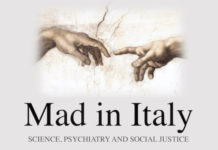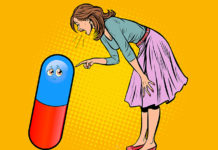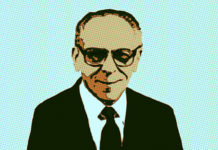Being-Towards-Suicide
Is it not the very capacity for suicide that makes us human? This capacity, this freedom, of autonomy’s jurisdiction to extend to the outermost seconds of life, namely death, is an innate part of humanity and thus consciousness. Accepting death as a possibility embraces the finitude of our existence.
Why Mad in Italy?
The Italian mental health system, like the majority of them around the world, struggles with accepting a model based on principles of Recovery, which highlights individual and communal mental health needs, social determinants of emotional distress, integration of physical and psychological care and quality of life.
A Guide to Long-Acting Neuroleptics: Education or Promotion?
The National Council for Behavioral Health has released a new pamphlet titled “Guide to Long-Acting Medications for Providers and Organizations.” By downplaying some aspects of the available science, the pamphlet implicitly acts as a promotional tool for the pharmaceutical industry.
The Pill Shaming Phenomenon: What’s It Really About?
At best, the underpinnings of the ‘pill shaming’ accusation are misguided. At worst, they represent a concerted effort on the part of the current power structure to use us against ourselves (and they don’t need any more help). It’s the same old story packaged up as if it were something new and ultra woke.
The Voices My Daughter Hears
The voices were extraordinary; in a way, they were like ghosts. I could not see them, but only divine them by the turmoil they stirred up in Annie. They were not polite house ghosts who knew when to leave; they were ne’er-do-wells she could not get rid of. They were tormentors and torturers, testing the limits of her sanity, blackmailing her into submission.
Madness, Sexuality and Legacies of Strategic Sanism
There has been little engagement between the survivor and LGBT movements despite a shared interest in critiquing and resisting the normalization project of the psy disciplines — that is, psychiatry and psychology’s clinical categorization of what is ‘normal’ and ‘abnormal’ or ‘healthy’ and ‘sick’. Why might this be?
“Three Identical Strangers” and the Nature-Nurture Debate
Three Identical Strangers is a riveting film describing the story of identical triplets separated at six months of age and reunited in early adulthood. Their story provides no evidence in support of the genetic side of the nature-nurture debate, but it does supply some evidence in favor of the environment.
To Warn or Not to Warn? A Critique of MIA’s Use of Diagnostic Terminology
I have concerns about how Mad In America deals with diagnostic terminology. When psychiatric diagnoses are used without signaling that they are constructs and unscientific, I feel alarmed for those who will be strengthened in their mistaken beliefs about the labels.
ECT Litigation Update: Are Patients Being Warned of Brain Damage Risk?
Upon review of hundreds of the "informed" consent forms received from those suffering permanent cognitive impairment after receiving ECT, the overwhelming majority do not provide the patient with any form of disclosure that "brain damage is a risk that can potentially occur from ECT, whether performed properly or not."
A Smashing Victory — And an Insidious New Threat
Afraid of facing me in court, the state gave up entirely and a young man was freed from involuntary ECT treatment. It was a total victory. Meanwhile, the Psychiatric Industrial Complex is finding more subtle ways to inflict electrical energy upon the brains of children labeled with ADHD.
When ‘For Your Own Good’ Actually Means ‘For My Own Good’
“For your own good” is oppressive. Embedded in that four-word phrase is the idea that each of us doesn’t understand who we are or what we need. Someone else is the expert. Someone else has the privilege to hold all the answers, and if those answers don't work for us then somehow it's our fault.
Public Purse a Cash Cow for Pharma: Could Taxpayer Dollars Be Better Spent?
In Oregon, which has only about 1% of the national population, medical expenditures for psychiatric drugs in fiscal year 2017-2018 were $82.2 million for adults, and another $8.7 million for youth. Every advocate in the US should request these figures from their state Medicaid offices.
Tough Love for Thomas Szasz: A Book Review
Dr. Thomas Szasz (1920-2012) was one of the greatest thinkers and prose stylists of the last 100 years. Enough time has passed since he died that we can start to take stock of his legacy. This important new collection of essays by former colleagues, psychiatrists, philosophers, and legal experts does just that.
I’m Introverted, Not Depressed!
Urging introverts to act more extroverted as a pathway to greater life satisfaction is wrongheaded. Elizabeth's case is one where the demoralization and despondency she experiences—forced to sacrifice her needs as an introvert to comply with the social scripts required to live in an extroverted world—masquerades as depression.
Blaming the System May Be the Best Therapy
If this were an old sci-fi movie, psychiatry would be the evil alien race on a collision course with earth that plans to completely take it over as soon as it can. That we are not treating psychiatry as the malevolent invader that it is shows only how deeply we’ve fallen for its facade of helping people.
Helping Children to Overcome OCD: 6 Creative Strategies for Parents
Here, Dr. Ben Furman offers a creative approach to helping children who struggle with OCD. Explaining why behaviors like reasoning, reassuring, and superstitious rituals don’t work, he suggests engaging alternatives that teach kids how to manage their “worry monster” and make sense of their distressing experience.
FDA Approves Using Electricity All Night Long on Children’s Brains
The FDA just approved sales of an electrical device called the Monarch eTNS to be used on the brains of children diagnosed with so-called ADHD. The device “sends therapeutic signals to the parts of the brain thought to be involved in ADHD,” according to the FDA press release. “Therapeutic signals”? Really?
Are Antidepressants Enabling the Population to Tolerate the Intolerable?
Just how sad is our current state of affairs that it causes so much of the population to feel depressed and/or anxious? Just how much are these drugs changing the state of our society as a whole? Are the drugs desensitizing the population to the point that it will tolerate social conditions it would otherwise find intolerable?
My Son and the “Mental Health” System
As a father whose 27-year-old son is trapped in the mental health system, I am painfully aware that I have been unable to protect him. At age 19, my son naively told his mother and his doctor that he was hearing voices, marking the beginning of a hellish nightmare which he is still unavoidably immersed in. I would like to explain my perspective on why this is the case.
Recovery Versus Mad Pride: Exploring the Contradictions
What would mental health treatment look like if it balanced an awareness of the need for “recovery” with an awareness that people also sometimes need to go “out of their minds” to resolve problems that they haven’t been able to solve otherwise, or maybe that their entire culture has not been able to face and resolve?
Stop Shocking and Torturing Women – My Sisters
Think of all those women who have undergone or will undergo electroshock and suffer severe losses in memory, intelligence, special skills, creativity. Women too disabled by shock to pursue promising careers. Women who suddenly die after being shocked. Electroshock is torture, and informed consent in psychiatry is a myth and a lie.
Reflections on 25,000 Hours of Being With People in Extreme States
Being with someone in an extreme state or other emotional pain, it feels like we’re two young friends who have ridden our bikes to a quiet place by the river and my friend turns to tell me about awful things happening at home — and they cry or yell in anger while I sit there and wonder what to say or do, and realize that just being quiet is okay.
Thought About Killing Yourself Lately? It’s Not All In Your Head
As the world economic leader in GDP at $24 trillion per year, the United States has had steadily rising suicide rates for nearly two decades, though when compared to other economic leaders such as France, Germany, Japan, India, the UK and Italy, it remains the outlier; the rest have dropped. Why is the United States unique in its degree of misery?
On Human Nature and Its Implications for the Mind-Body Problem
Peter Hacker's magnum opus explores what it means to be human via an analysis of the language we use. Through disclosing the conceptual framework within which we think, act and come to know things, our deep and implicit understanding of ourselves and our world is revealed.
Forced Drugging with Antipsychotics is Against the Law: Decision in Norway
In all countries, we need to work for ensuring that forced medication for psychiatric patients is forbidden by law. Virtually all countries, apart from the US, have ratified the UN Convention on the Rights of Persons with Disabilities, which prohibits forced drugging, but not a single country has done anything.

































